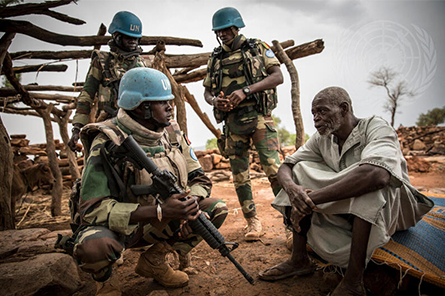Sustaining Peace & SSG/R
The ‘Sustaining Peace’ agenda emerged in 2016 as a new approach to preventing the outbreak, continuation, and recurrence of conflict. The important role of Security Sector Reform (SSR) in sustaining peace is clearly reflected in Security Council resolution 2151 (2014), which notes that “an effective, professional and accountable security sector without discrimination and with full respect for human rights and the rule of law is the cornerstone of peace and sustainable development and is important for conflict prevention.”
In addition, as noted in the Secretary-General’s second report on SSR, “effective governance and oversight of the security sector to mitigate its politicization or instrumentalization can be vital to conflict prevention.”
We provide policy support to the UN to further advance the discussions on the important role of SSR in sustaining peace across the globe, including the challenges and opportunities that this field can offer. We also conduct research to reflect on the role of SSR in specific phases of the peace continuum, including in the mediation of peace processes.

Workstreams/Projects
As recognised by the President of 72nd session of the UN General Assembly, security actors can “hold the tools which can pull societies back from the brink of conflict – or push them over the edge.” However, while the role played by SSR in supporting sustaining peace efforts has been largely recognised by the UN, many challenges remain, including the lack of national ownership in some externally-assisted SSR processes, the sustainability of the reforms supported, and the importance of partnerships.
To support the UN to advance the policy discussions on these areas and to ensure a successful contribution of SSR assistance in the implementation of the sustaining peace agenda, we regularly support the organization of high-level events. For instance, in April 2018, DCAF supported the organization of a ‘High-Level Roundtable on Security Sector Reform and Sustaining Peace’ at the UN’s New York headquarters. The event was co-hosted by Slovakia and South Africa on behalf of the UN Group of Friends of SSR on the eve of the High-Level Meeting of the General Assembly on Peacebuilding and Sustaining Peace.
This project is funded by several donors, including by the Swiss Federal Department of Foreign Affairs (FDFA) and by the Slovak Agency for International Development Cooperation (SAIDC).
Publications and further reading
As SSR addresses the rearrangement of security-related power structures, it often plays a central role in peace processes. Negotiations and the agreements that follow also have far-reaching implications for SSR as they set the agenda for post-conflict security reforms.
Moreover, SSR is only one of a suite of post-conflict security issues that may be initiated during a peace process. Similar to SSR, disarmament, demobilization and reintegration (DDR), small arms and light weapons (SALW) control and mine action play crucial roles in post-conflict security and have all direct links to SSG.
This project sought to better articulate the linkages between peace processes and SSR and related issues, and analysed how these relationships have been integrated, neglected, or ignored in recent peace processes.
This project has been funded by the Swiss Federal Department of Foreign Affairs and DCAF Core funding.
Publications and further reading
- Provisions on SSR and DDR in Peace Agreements (Thematic Brief, 2020)
- Mine Action in Peace Mediation: Promoting a Strategic Approach (Thematic Brief, 2020)
Publications and further reading
- The United Nations and Security Sector Reform: Policy and Practice , Adedeji Ebo and Heiner Hänggi (eds), (LIT Verlag 2020)
- Putting the UN’s security sector reform policy into practice, Heiner Hänggi (Blog Post, 2020)
PAST RESEARCH
Contacts
Vincenza Scherrer, Head, Policy Engagement (v.scherrer@dcaf.ch)
